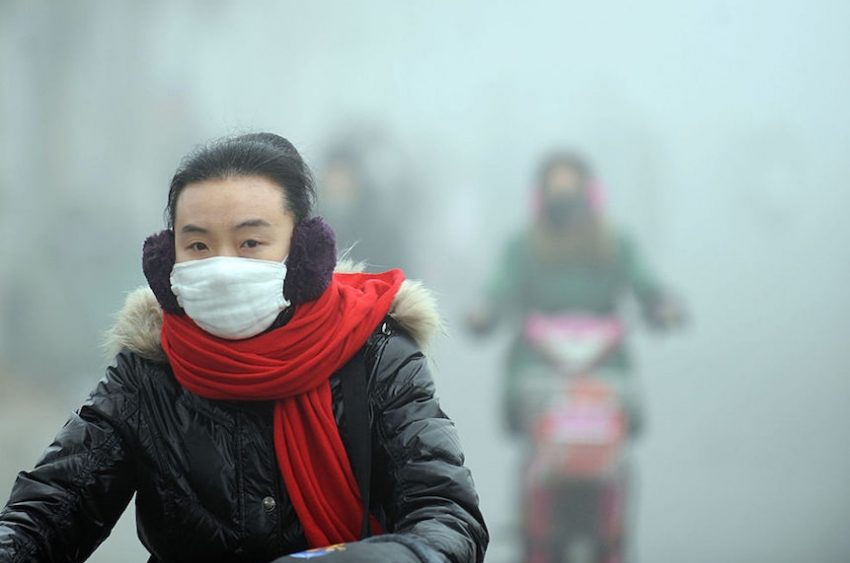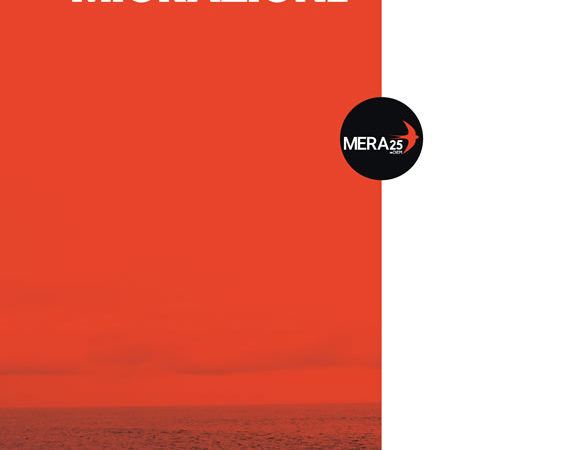On China’s smog problem and the ecological crisis.
In December 2016, smog in big Chinese cities became so thick that thousands fled into the countryside, trying to reach a place where one could still see blue sky—this “airpocalypse” affected half a billion people. For those who remained, moving around began to resemble life in a post-apocalyptic movie: people walking around with large gas masks in a smog where even nearby trees were invisible. The class dimension played a crucial role: Before the authorities had to close airports because of the bad air, those who could afford an expensive flight abandoned the affected cities. And, to add insult to injury, Beijing’s lawmakers considered listing smog as a meteorological disaster, an act of nature, not an effect of industrial pollution, to prevent blaming the authorities for the catastrophe. A new category was thus added to the long list of refugees from wars, droughts, tsunamis, earthquakes, economic crises, etc.—smog refugees.
Perhaps the most surprising thing about this airpocalypse is its quick normalization: After the authorities could no longer deny the problem, they established procedures that would somehow enable people to continue their daily life by way of following new routines, as if the catastrophic smog were just a new fact of life. On designated days, you try to stay at home as much as possible and, if necessary, walk around with masks. Children rejoice in the news that on many days schools are closed—an opportunity to stay at home and play. Making a trip to the countryside, where the blue sky is still visible, becomes a special occasion one looks forward to (there are already agencies in Beijing specialized for such one-day trips). The important thing is not to panic and to maintain the appearance that, in spite of all troubles, life goes on …
One thing is sure: An extraordinary social and psychological change is taking place right in front of our eyes—the impossible is becoming possible. An event first experienced as impossible but not real (the prospect of a forthcoming catastrophe which, however probable we know it is, we do not believe will effectively occur and thus dismiss as impossible) becomes real but no longer impossible (once the catastrophe occurs, it is “renormalized,” perceived as part of the normal run of things, as always-already having been possible). The gap which makes these paradoxes possible is the one between knowledge and belief: we know the (ecological) catastrophe is possible, probable even, yet we do not believe it will really happen.
Recall the siege of Sarajevo in the early 1990s: The fact that a “normal” European city of half a million inhabitants will be encircled, starved, regularly bombed, its citizens terrorized by sniper fire, etc., and that this will go on for 3 years, would have been considered unimaginable before 1992—it would have been extremely easy for the Western powers to break the siege and open a small safe corridor to the city. When the siege began, even the citizens of Sarajevo thought this is a short-term event, trying to send their children to safety “for a week or two, till this mess is over.” And then, very fast, the siege was “normalized.” This same passage from impossibility to normalization (with a brief intermediary stage of panicky numbness) is clearly discernible in how the U.S. liberal establishment reacted to Trump’s victory. It is also clearly at work in how state powers and big capital relate to ecological threats like the ice meltdown on the poles. The very same politicians and managers who, until recently, dismissed the fears of global warming as the apocalyptic scare-mongering of ex-Communists, or at least as premature conclusions based on insufficient evidence, assuring us that there is no reason for panic, that, basically, things will go on as usual, are now all of a sudden treating global warming as a simple fact, as part of the way things are “going on as usual” …
In July 2008, CNN was repeatedly showing a report “The Greening of Greenland,” celebrating the new opportunities that the melting of ice offers to Greenlanders—they can already grow vegetables in the open land, etc. The obscenity of this report is not only that it focuses on the minor benefit of a global catastrophe; it also plays on the double meaning of “green” in our public speech (“green” for vegetation; “green” for ecological concerns), so that the fact that more vegetation can grow on the Greenland soil because of global warming is associated with the rising of ecological awareness. Are such phenomena not yet another example of how right Naomi Klein was when, in her Shock Doctrine, she described the way global capitalism exploits catastrophies (wars, political crises, natural disasters) to get rid of the “old” social constraints and impose its agenda on the slate cleared by the catastrophe? Perhaps, the forthcoming ecological disasters, far from undermining capitalism, will serve as its greatest boost.
What gets lost in this shift is the proper sense of what is going on, with all the unexpected traps the catastrophe hides. For example, one of the unpleasant paradoxes of our predicament is that the very attempts to counteract other ecological threats may contribute to the warming of the poles: the ozone hole helps shield the interior of the Antarctic from global warming, so if it is healed, the Antarctic could quickly catch up with the warming of the rest of the Earth… One thing at least is sure. In the last decades, it was fashionable to talk about the predominant role of “intellectual labor” in our postindustrial societies—however, materiality is now reasserting itself with a vengeance in all its aspects, from the forthcoming struggle for scarce resources (food, water, energy, minerals) to environmental pollution.
Even when we profess the readiness to assume our responsibility for ecological catastrophes, this can be a tricky stratagem to avoid the true dimensions of a catasatrophe. There is something deceptively reassuring in this readiness to assume the guilt for the threats to our environment: We like to be guilty since, if we are guilty, then it all depends on us, we pull the strings of the catastrophe, so we can also save ourselves simply by changing our lives. What is really difficult for us (at least for us in the West) to accept is that, as individuals, we are reduced to a purely passive role of those who can only sit and watch what our fate will be—to avoid such a situation, we are prone to engage in a frantic obsessive activity, recycle old paper, buy organic food, whatever, just so that we can be sure that we are doing something, making our contribution—like a soccer fan who supports his team in front of a TV screen at home, shouting and jumping from his seat, in a superstitious belief that this will somehow influence the outcome.
It is true that the typical form of fetishist disavowal apropos ecology is: “I know very well (that we are all threatened), but I don’t really believe it (so I am not ready to do anything really important like changing my way of life).” But there is also the opposite form of disavowal: “I know very well that I cannot really influence the process which can lead to my ruin (like a volcanic outburst), but it is nonetheless too traumatic for me to accept this, so I cannot resist the urge to do something, even if I know it is ultimately meaningless.” Is it not for the same reason that we buy organic food? Who really believes that the half-rotten and expensive “organic” apples are really healthier? The point is that, even if they really are healthier (and many of them probably are), we buy them because by way of buying them, we do not just buy and consume a product—we simultaneously do something meaningful, show our care and global awareness, we participate in a large collective project.
We have to finish with such games. The airpocalypse in China is a clear indication of the limits of our predominant environmentalism, this strange combination of catastrophism and routine, of guilt-feeling and indifference. Ecology is today one of the major ideological battlefields, with a whole series of strategies to obfuscate the true dimensions of the ecological threat: (1) simple ignorance: It’s a marginal phenomenon, not worthy of our preoccupation, life (of capital) goes on, nature will take care of itself; (2) science and technology can save us; (3) leave the solution to the market (higher taxation of the polluters, etc.); (4) superego pressure on personal responsibility instead of large systemic measures: Each of us should do what he/she can—recycle, consume less, etc.; (5) maybe the worst of them all – worst in its ideological effects – is the advocating of a return to natural balance, to a more modest, traditional life by means of which we renounce human hubris and become again respectful children of our Mother Nature.
Does the predominant ecological discourse not address us as a priori guilty, indebted to mother nature, under the constant pressure of the ecological superego-agency which addresses us in our individualty: “What did you do today to repay your debt to nature? Did you put all newspapers into a proper recycle bin? And all the bottles of beer or cans of Coke? Did you use your car where you could have used a bike or some means of public transport? Did you use air conditioning instead of just opening wide the windows?” The ideological stakes of such individualization are easily discernible: I get lost in my own self-examination instead of raising much more pertinent global questions about our entire industrial civilization. Plus one should note how this culpabilitization is immediately supplemented by an easy way out: recycle, buy organic food, use renewable energy, etc., and you no longer have to feel guilty, you can enjoy your life as usual.
Another trap to be avoided is the moralizing anti-capitalism—all the talk about how capitalism is sustained by the egotist greed of individual capitalists for more power and wealth. In actual capitalism, personal greed is subordinated to the impersonal striving of the capital itself to reproduce and to expand. One is thus almost tempted to say that what we really need is more, not less, enlightened egotism. Take the ecological threat: no pseudo-animistic love for nature is needed to act here, just a long-term egotist interest. The conflict between capitalism and ecology may appear to be a typical conflict between pathological egotistic-utilitarian interests and the properly ethical care for the common good of humanity. Upon a closer look, it immediately becomes clear that the situation is exactly the opposite one: It is our ecological concerns that are grounded in the utilitarian sense of survival: They simply stand for the enlightened self-interest, at its highest for the interest of the future generations against our immediate interest. The New Age spiritualist notion of the sacredness of life as such, of the right of environment to its preservation, etc., plays no necessary role in our ecological awareness. If we are looking for the ethical dimension in this entire affair, it is to be found in capitalism’s unconditional commitment to its own ever-expanding reproduction: a capitalist who dedicates himself unconditionally to the capitalist self-expansive drive is effectively ready to put everything, including the survival of humanity, at stake, not for any “pathological” gain or goal, but just for the sake of the reproduction of the system as end-in-itself. Fiat profitus pereat mundus (let profits be made, though the world perish) is what we presume to be its motto. This ethical motto is, of course, weird, if not outright evil—however, from a strict Kantian perspective, we should not forget that what makes it repulsive to us is our purely “pathological” survivalist reaction: a capitalist, insofar as he acts “in accordance with his notion,” is someone who faithfully pursues a universal goal, without regard for any “pathological” obstacles.
So what is to be done, as Lenin would have put it? In his What Happened in the XXth Century?, Peter Sloterdijk provides his own outline of what is to be done in the XXIst century, best encapsulated in the titles of the first two essays in the book, “The Anthropocene” and “From the Domestication of Man to the Civilizing of Cultures.”
“Anthropocene” designates a new epoch in the life of our planet in which we, humans, cannot any longer rely on the Earth as a reservoir ready to absorb the consequences of our productive activity: We cannot any longer afford to ignore the side effects (collateral damage) of our productivity, they cannot any longer be reduced to the background of the figure of humanity. We have to accept that we live on a “Spaceship Earth,” responsible and accountable for its conditions. Earth is no longer the impenetrable background of our productive activity, it emerges as a(nother) finite object that we can inadvertently destroy or transform to make it unlivable. This means that, at the very moment when we become powerful enough to affect the most basic conditions of our life, we have to accept that we are just another animal species on a small planet – what enforces this acceptance is our very global destructive power. A new way to relate to our environs is necessary once we realize this: no longer a heroic worker expressing his/her creative potentials and drawing from the inexhaustible resources from his/her environs but a much more modest agent collaborating with his/her environs, permanently negotiating a tolerable level of safety and stability.
Is the very model of ignoring the collateral damage not capitalism? What matters in capitalist reproduction is the self-enhancing circulation focused on profit, and the collateral damage done to the environs not included into costs of production is in principle ignored—even the attempts to take it into account through taxation (or by way of directly putting a price tag on every natural resource one uses, including air) cannot but misfire. So in order to establish this new mode of relating to our environs, a radical politico-economic change is necessary, what Sloterdijk calls “the domestication of the wild animal Culture.” Till now, each culture educated and disciplined its own members and guaranteed civic peace among them in the guise of state power, but the relationship between different cultures and states was permanently under the shadow of potential war, with each state of peace nothing more than a temporary armistice. As Hegel conceptualized it, the entire ethic of a state culminates in the highest act of heroism, the readiness to sacrifice one’s life for one’s nation-state, which means that the wild barbarian relations between states serve as the foundation of the ethical life within a state. Is today’s North Korea, with its ruthless pursuit of nuclear weapons and rockets to hit with them distant targets, not the ultimate caricature of this logic of unconditional Nation-State sovereignty?
The moment we fully accept the fact that we live on a Spaceship Earth, the task that urgently imposes itself is that of civilizing civilizations themselves, of imposing universal solidarity and cooperation among all human communities, a task rendered all the more difficult by the ongoing rise of sectarian religious and ethnic “heroic” violence and readiness to sacrifice oneself (and the world) for one’s specific Cause. The overcoming of capitalist expansionism, wide international cooperation and solidarity should also be able to transform itself into an executive power ready to violate state sovereignty, etc. Are these not all measures destined to protect our natural and cultural commons? If they do not point towards communism, if they do not imply a communist horizon, then the term “communism” has no meaning at all.
Originally published in In These Times.
Volete essere informati delle azioni di DiEM25? Registratevi qui!




